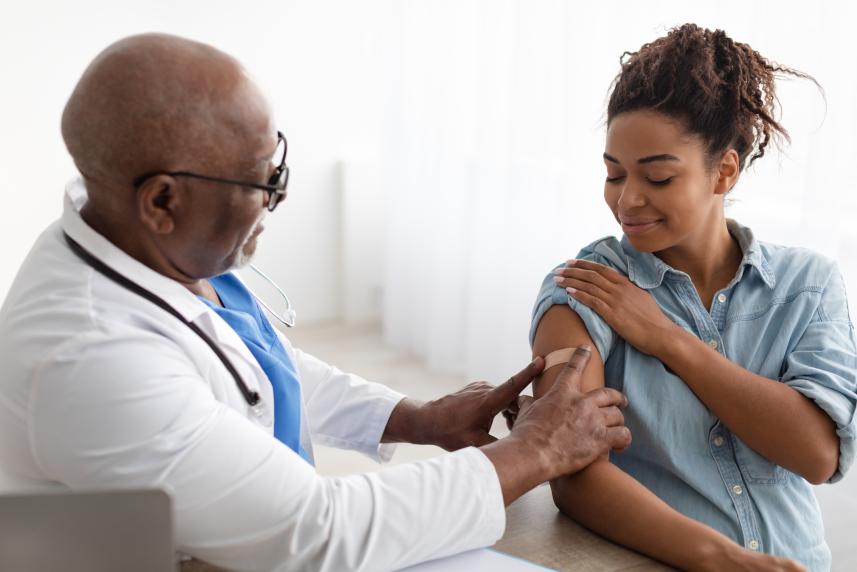Why adults need their shots, too
Are you up to date on all the vaccines you need? There’s a four in five chance you’re not. Here’s what you need to know to help you stay healthy.

When you visit a doctor with a child, you expect vaccines to come up. But when you're an adult, they can slip under the radar. In fact, only about one in five U.S. adults are current on all their recommended vaccinations, according to the Centers for Disease Control and Prevention (CDC). This gap could put you and your loved ones at serious risk.
Staying on top of important vaccines should be a no-brainer. But many adults hesitate to get the regular vaccinations they need, such as those that protect against pneumonia, COVID, and the flu. For some, work and life get in the way. Others don't fully understand what vaccines do. According to the Cleveland Clinic Journal of Medicine, safety concerns — such as fears of adverse effects — are among the top reasons people delay or avoid vaccines.
Here are answers to some of the most common questions about vaccines in adulthood — plus, the specific shots you may want to discuss with your doctor.
I had vaccines when I was a kid. Why do I need more now?
According to the CDC, there are three key reasons adults need to review their immunization history with their doctor:
- Vaccines can wear off over time. Immunity from some childhood vaccines diminishes as you age, making booster shots necessary to maintain protection.
- Adults have their own shortlist of necessary vaccines. As we age, our bodies need help fighting different diseases than when we were young. So, you may need a vaccine that you didn’t get as a child.
- Vaccines are often updated to fight new strains. Viruses can mutate over time, leading to new strains. Vaccines, such as those for the flu and COVID, are updated regularly to combat these evolving threats.
Is natural immunity better than the kind we get from vaccines?
Both natural immunity and vaccines help your body learn how to fight off germs. But there are many reasons not to rely on natural immunity alone.
Natural immunity means your immune system builds defense against a germ after you've had the disease. The problem? You first have to get sick, which can be risky. Diseases like chickenpox can lead to pneumonia, and hepatitis B can raise the risk of liver cancer, according to the CDC.
Plus, vaccine-based immunity is often stronger and longer lasting. For example, the CDC found that COVID vaccination provided more consistent protection against reinfection than natural immunity alone.
Can herd immunity protect me instead?
Not always. Herd immunity happens when enough people in a community are immune — either through vaccines or past infection — that the disease can’t easily spread. According to the Proceedings of the National Academy of Sciences (PNAS), the threshold for herd immunity varies by disease and is hard to determine precisely because it depends on vaccination rates in a given area.
What’s more, outbreaks can still happen when vaccination rates drop.
Measles, for example, was considered eliminated in the U.S. in 2000. Yet in 2019, the CDC reported new cases due to a rise in unvaccinated individuals. And in April 2025, Texas faced a growing measles outbreak. Health officials linked it to pockets of low vaccination coverage, emphasizing how quickly a once-rare illness can return without strong community protection.
What are the vaccines I need as an adult?
The best person to answer that is your doctor. You may have missed vaccines as a child. Your doctor will make sure you’re up to date on the shots you need. Those might include vaccines for:
- Chickenpox
- Human papillomavirus, or HPV, a common virus that can lead to several types of cancer, including cervical, anal, and throat cancer.
- Hepatitis A and B, two viruses that can cause serious liver disease.
- Viruses specific to an area where you’ll be traveling
And if you’ve had a bad reaction to vaccines in the past, they can help you navigate that as well.
That said, the CDC recommends several vaccines for adults. Some, such as the flu shot, you need every year. Others are just one-and-done.
Flu shot
What it is: This vaccine protects you against the flu and its effects. Some people may think the flu is no more harmful than the common cold. But the symptoms are usually more intense. You can have a fever, painful body aches and lots of congestion. The flu can bring on other illnesses. For example, a sinus or ear infection, or a lung infection like pneumonia. It can also lead to serious issues with the heart muscle or brain.
When you need it: Pretty much everyone should get a flu shot each year. In general, the flu shot for the coming season is available in August. But if you wait a little longer to get it, that’s OK. Flu season can last until May, so it’s never too late.
Tdap vaccine
What it is: This one shot protects you from three types of bacteria (germs) that can cause dangerous diseases. They are tetanus, diphtheria and pertussis.
You can get tetanus through cuts or wounds. It causes painful stiffening of the muscles.
The last two spread from person to person. Diphtheria can lead to breathing and heart issues, or even death.
You may know pertussis by its other name, “whooping cough.” It can cause violent coughing fits that make it hard to breathe or eat. Babies can’t get the pertussis vaccine until they’re 2 months old, so they’re especially vulnerable.
When you need it: If you never had a Tdap shot as a child, now’s the time. Talk to your doctor about getting one. Then you’ll need a booster shot every 10 years.
Pneumonia (pneumococcal) vaccine
What it is: This vaccine protects against pneumococcal disease. This disease can cause a slew of issues. The most common one is pneumonia. But it can also lead to meningitis, sepsis (or blood infections) and ear infections.
When you need it: You may need only one shot when you turn 65, depending on your vaccination history. People 65 and older are at a higher risk of serious illness from pneumococcal disease. If you’re under 65 and have a chronic disease, your doctor may recommend that you get the vaccine now.
Shingles vaccine
What it is: It protects you against the varicella-zoster virus. That’s the same virus that causes chickenpox. Here’s what happens: After a chickenpox infection heals, the virus remains quiet inside the body. Later on in life, it can reactivate and cause shingles.
This time the virus can cause a painful skin rash, usually on one side of the face or body. Some people also get blisters, numbness and shooting pains.
When you need it: When you’re 50 or older. As you age, the risk of shingles increases. While a chickenpox vaccine came about in 1995, most people are living with the virus that causes shingles.
Updated COVID vaccine
What it is: It helps prevent you from becoming seriously ill from COVID.
When you need it: If you haven’t had your first two doses, it’s not too late. And if it’s been a while since you've had your first doses, you may consider an updated COVID shot. Protection may wane after four to six months, so future shots may be required.
The bottom line: Getting vaccinated is a smart way to keep yourself healthy and safe. What's recommended for you will depend on your age, where you live, community outbreaks and your future travel plans. It’s a good idea to ask your doctor what’s right for you.


